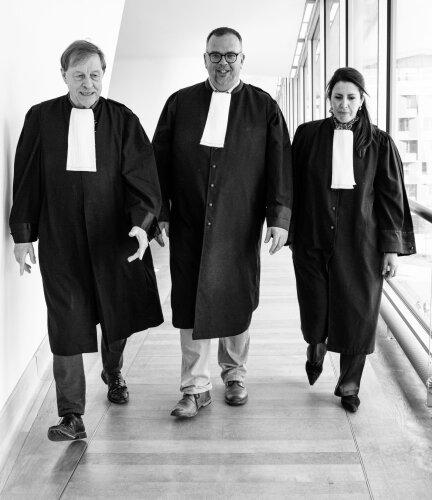Best Job Discrimination Lawyers in Antwerp
Share your needs with us, get contacted by law firms.
Free. Takes 2 min.
List of the best lawyers in Antwerp, Belgium
About Job Discrimination Law in Antwerp, Belgium
Job discrimination in Antwerp, Belgium, refers to the unfair treatment of individuals in their work environment based on characteristics such as ethnicity, gender, age, sexual orientation, disability, and religion, among others. Belgium has a strong legal framework in place to protect employees from workplace discrimination, including a broad range of anti-discrimination laws that apply to hiring, promotions, wage disparities, and dismissal situations. In Antwerp, both federal and regional regulations work together to safeguard workers' rights, emphasizing equality and diversity in the workplace.
Why You May Need a Lawyer
There are several situations where seeking legal advice regarding job discrimination may be necessary. These include:
- Facing unfair or biased treatment during the hiring process.
- Being demoted or overlooked for promotions due to discriminatory practices.
- Receiving unequal pay for the same work compared to peers without justification.
- Experiencing harassment or a hostile work environment due to personal characteristics.
- Being unjustly terminated based on discriminatory reasons.
A lawyer specializing in job discrimination can help you understand your rights, evaluate the merits of your case, provide guidance on legal procedures, and represent you in negotiations or court if necessary.
Local Laws Overview
In Antwerp, job discrimination is primarily governed by the General Anti-Discrimination Act, the Gender Act, and several European Union directives integrated into Belgian law. Key aspects include:
- Direct and Indirect Discrimination: The law prohibits both direct discrimination (obvious unfair treatment) and indirect discrimination (policies that appear neutral but disadvantage a particular group).
- Protected Characteristics: Includes race, skin color, nationality, descent or national or ethnic origin, gender, age, sexual orientation, civil status, birth, wealth, belief or religion, present or future health status, disability, language, political opinion, physical or genetic features, and social origin.
- Equal Opportunities and Treatment: Employers are required to ensure equal access and treatment in all aspects of employment, from recruitment to dismissal.
- Burden of Proof: Once a prima facie case of discrimination is established, the employer must prove that no discrimination occurred.
Frequently Asked Questions
What should I do if I suspect job discrimination?
If you suspect discrimination at work, document all relevant incidents, gather any supporting evidence, and consider discussing the issue with a trusted supervisor or HR department. Consulting a legal expert may be necessary to further assess your options.
Is there a time limit to file a discrimination complaint?
In Belgium, you generally have one year from the date of knowledge of the discriminatory act to file a complaint. However, specific timelines may vary depending on the particular case and legal advice is recommended to ensure compliance with deadlines.
Can I report discrimination anonymously?
It is challenging to file a formal complaint anonymously as these usually require the claimant's details. However, initial inquiries or seeking advice from specific bodies, such as the Centre for Equal Opportunities, can be done without revealing your identity.
What kind of evidence is needed to support my discrimination claim?
Relevant evidence may include written communications (emails, letters), witness testimonies, records of incidents, and any company policies that might support your claim of unfair treatment.
Can I be fired for filing a discrimination complaint?
Belgian law prohibits retaliatory actions against individuals who file discrimination complaints. If you experience retaliation, this can be grounds for an additional claim.
Does the law protect all employees in Antwerp?
Anti-discrimination laws in Antwerp apply broadly to all individuals involved in employment, including permanent, temporary, full-time, part-time, and even unpaid workers.
How long does a discrimination case take to resolve?
The duration of a discrimination case can vary significantly based on its complexity, the parties involved, and court schedules. Some cases may settle quickly, while others may take months or even years.
Are there alternative dispute resolutions available?
Yes, alternative dispute resolutions like mediation or arbitration are available and can provide a less adversarial and quicker solution compared to court litigation.
What are potential outcomes if my claim is successful?
Possible outcomes include compensation for damages, reinstatement of a job position, corrective measures by the employer, and sometimes punitive damages.
Can a lawyer help me negotiate a settlement outside of court?
Absolutely, lawyers experienced in job discrimination cases can negotiate on your behalf to reach a fair settlement, potentially avoiding the need for lengthy court proceedings.
Additional Resources
Consider reaching out to the following resources for support and guidance:
- Unia: Belgium’s independent public institution combating discrimination and promoting equal opportunities.
- Your local trade union: They often provide legal services or direct you to competent professionals.
- Federal Public Service Employment, Labour and Social Dialogue: Offers resources and information about labor laws.
Next Steps
If you believe you are a victim of job discrimination, it's crucial to act promptly. Begin by documenting everything related to the discrimination case and consider the following steps:
- Contact a legal professional who specializes in discrimination law to discuss your situation and explore options.
- Reach out to organizations like Unia for guidance and potential mediation services.
- Familiarize yourself with your rights under the relevant laws to better understand your position.
- Consider discussing the issue directly with your employer if it's safe to do so and could lead to a resolution.
Taking these actions can help you protect your rights and work towards resolving any workplace discrimination issues effectively.
Lawzana helps you find the best lawyers and law firms in Antwerp through a curated and pre-screened list of qualified legal professionals. Our platform offers rankings and detailed profiles of attorneys and law firms, allowing you to compare based on practice areas, including Job Discrimination, experience, and client feedback.
Each profile includes a description of the firm's areas of practice, client reviews, team members and partners, year of establishment, spoken languages, office locations, contact information, social media presence, and any published articles or resources. Most firms on our platform speak English and are experienced in both local and international legal matters.
Get a quote from top-rated law firms in Antwerp, Belgium — quickly, securely, and without unnecessary hassle.
Disclaimer:
The information provided on this page is for general informational purposes only and does not constitute legal advice. While we strive to ensure the accuracy and relevance of the content, legal information may change over time, and interpretations of the law can vary. You should always consult with a qualified legal professional for advice specific to your situation.
We disclaim all liability for actions taken or not taken based on the content of this page. If you believe any information is incorrect or outdated, please contact us, and we will review and update it where appropriate.









